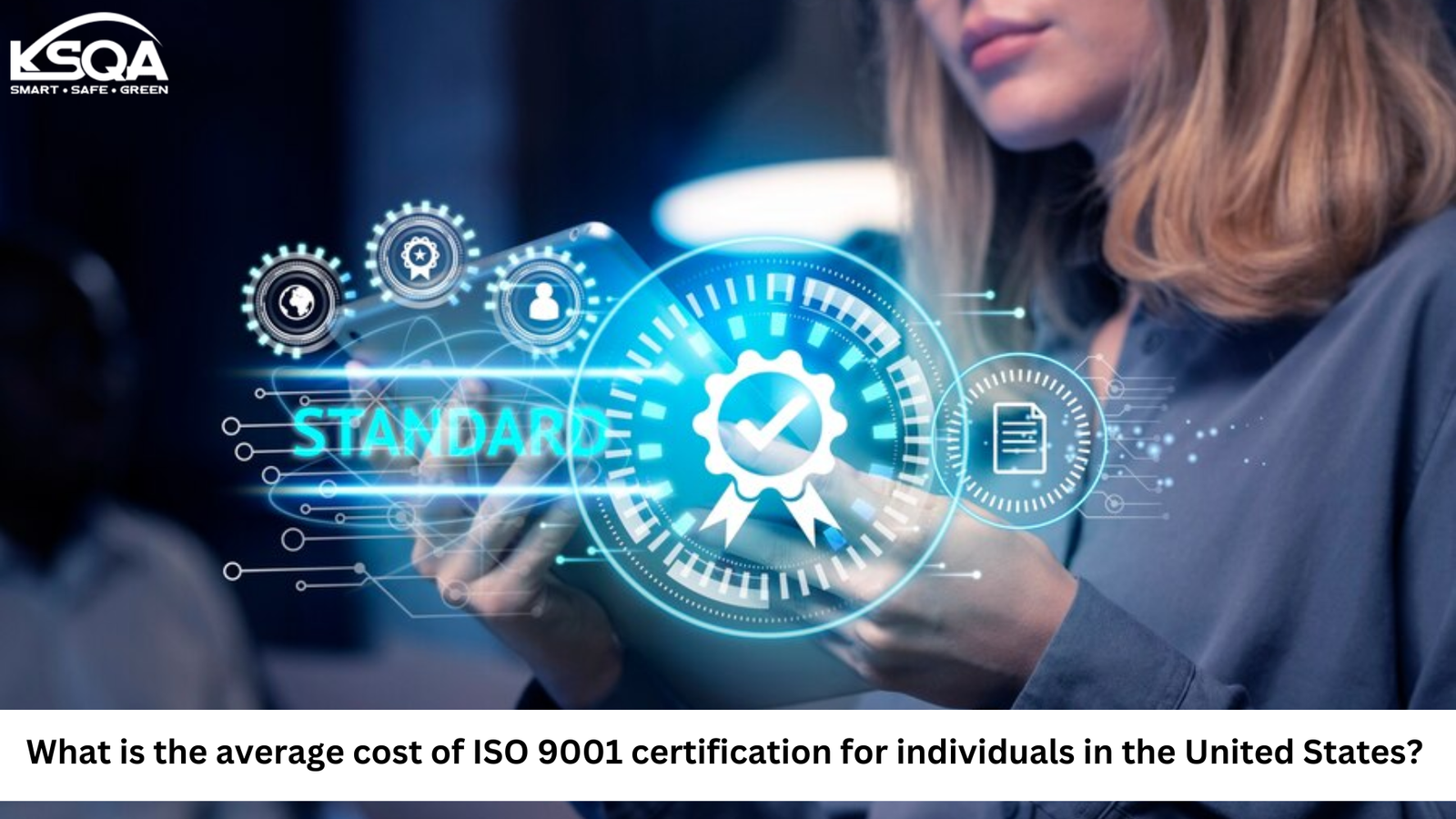In the business world, maintaining exceptional quality is important for success. To showcase their dedication to quality management, organizations opt for ISO 9001 certification. This certification acts like a gold standard, assuring customers and partners that a company follows standards in its processes.
ISO 9001 not only signifies a commitment to quality but also serves as a powerful tool for organizations to stand out in a competitive market by delivering products.
In this blog, we’ll explore the essential aspects of ISO 9001 auditor certification, break down the costs for small businesses seeking ISO certification, and provide a simple guide on how to obtain ISO certification.

Benefits Of ISO 9001 Auditor Certification
Certified ISO 9001 auditors bring a wealth of benefits to organizations and the overall quality management process. Here are some points how it can help you:
1. Enhanced Credibility
An organization with certified auditors gains credibility in the eyes of customers, partners, and regulatory bodies. Certification serves as evidence of a commitment to quality.
2. Efficient Audits
Certified auditors are equipped with the skills to conduct efficient and effective audits. This ensures that the audit process adds value to the organization without unnecessary disruptions.
3. Risk Identification
Auditors with certification are adept at identifying potential risks and areas for improvement. This proactive approach helps organizations address issues before they become significant problems.
4. Global Recognition
ISO 9001 certification is globally recognized. This means that auditors can contribute to quality management practices on an international scale, opening up opportunities for cross border collaboration.
What Are ISO Certification Costs for Small Businesses ?
For small businesses aspiring to achieve ISO certification, understanding the associated costs is crucial. Let’s dive into the factors that contribute to ISO certification costs and explore ways for small businesses to manage these expenses.
1. Factors Influencing ISO Certification Costs
ISO certification costs can vary based on several factors, and understanding these factors is essential for small businesses
- Size and Complexity – The size and complexity of a business influence certification costs. Larger and more complex organizations may incur higher expenses due to the intricacies of their operations.
- Industry Specifics – Certification requirements can vary by industry. Certain industries may have additional standards or regulations, impacting the certification process and costs.
- Consultancy Services – Many businesses choose to enlist the help of consultants to guide them through the certification process. While this can be beneficial, it adds to the overall cost.
- Training and Education – Training employees on ISO standards and certification processes is a critical component. The cost of training programs and materials contributes to the overall certification expenses.
- Document Preparation – Creating the necessary documentation to meet ISO standards requires time and resources. This includes developing manuals, procedures, and records.
2. Managing ISO Certification Costs for Small Businesses
While ISO certification is an investment, small businesses can take steps to manage and optimize costs. Here are some areas where the costs can be optimized.
- Prioritize Critical Areas – Focus on the critical areas that directly impact product or service quality. This targeted approach can streamline the certification process and reduce unnecessary expenses.
- InHouse Training – Consider providing inhouse training to employees, reducing the reliance on external training programs. This can be a cost effective way to ensure staff is well versed in ISO standards.
- Lean Documentation – Develop documentation that is concise and directly aligned with ISO requirements. Avoid unnecessary paperwork, focusing on efficiency and effectiveness.
- Utilize Online Resources – Leverage online resources and templates available for ISO certification. These resources can provide guidance and reduce the need for extensive external consultancy.
- Collaborate with Certification Bodies – Small businesses can explore collaboration with certification bodies that offer tailored solutions for smaller enterprises. Some certification bodies understand the unique challenges of small businesses and provide cost effective options.
3. Return on Investment (ROI) of ISO Certification
While there are costs associated with ISO certification, small businesses should also consider the potential returns on investment
- Market Access – ISO certification enhances market access by demonstrating a commitment to quality. This can lead to new opportunities, partnerships, and increased customer trust.
- Operational Efficiency – Implementing ISO standards often results in improved operational efficiency. Streamlined processes can lead to cost savings over time.
- Customer Confidence – ISO certification instills confidence in customers. They are more likely to choose a certified business over non certified competitors, contributing to increased sales and loyalty.
- Reduced Risks – ISO standards emphasize risk management. By addressing potential risks, businesses can avoid costly errors and disruptions, contributing to long term financial stability.
A Step By Step Processes On How to Get ISO Certification
Achieving ISO certification is a significant milestone for any organization. Let’s simplify the process with a step by step process on how to get ISO certification
1. Understand ISO Standards
Begin by understanding the specific ISO standards that apply to your industry or organization. ISO 9001 is a general quality management standard, but there are industry specific standards as well. Familiarize yourself with the requirements of the chosen standard.
2. Conduct a Gap Analysis
Evaluate your current processes against the requirements of the chosen ISO standard. This gap analysis helps identify areas that need improvement or alignment with ISO standards.
3. Develop Documentation
ISO standards often require comprehensive documentation of processes, procedures, and quality policies. Develop the necessary documentation to align with the standard’s requirements. This documentation serves as evidence of your commitment to quality.
4. Implementation of Processes
Implement the documented processes across your organization. This involves training employees, integrating new procedures into daily operations, and ensuring that everyone understands their roles in maintaining quality standards.
5. Internal Audits
Conduct internal audits to assess the effectiveness of your implemented quality management system. Internal audits help identify any nonconformities or areas for improvement. Address any issues identified during the internal audit.
6. Select a Certification Body
Choose an accredited certification body to perform the external certification audit. Research and select a certification body that aligns with your industry and organizational needs. Ensure that the certification body is recognized and respected.
7. External Certification Audit
The certification body will conduct an external audit to verify that your organization meets the requirements of the chosen ISO standard. This involves a thorough examination of your documentation, interviews with personnel, and observations of processes.
8. Certification Decision
Based on the findings of the external audit, the certification body will make a certification decision. If your organization meets the requirements, you will be awarded ISO certification. The certification is typically valid for a specific period, and organizations undergo regular surveillance audits to maintain certification.
9. Continuous Improvement
ISO certification is not a one time achievement. Commit to a culture of continuous improvement by regularly reviewing and enhancing your quality management system. This involves addressing any nonconformities identified during audits and staying updated with changes in ISO standards.
Conclusion
In the pursuit of quality excellence, ISO 9001 certification stands as a guiding light for businesses. The journey to certification, accompanied by ISO 9001 auditors and a clear understanding of ISO certification cost for small business is a pathway to enhanced credibility, customer satisfaction, and operational efficiency.
Small businesses, despite their size, can navigate the process by managing costs strategically and realizing the significant returns on investment.
Ready to elevate your business? Secure trust, enhance quality, and unlock new opportunities with ISO 9001 certification under the guidance of KSQA. Contact us to embark on the path of excellence and demonstrate your commitment to top-notch quality management. Transform your organization today!


.jpg)
.jpg)
.jpg)

.jpg)